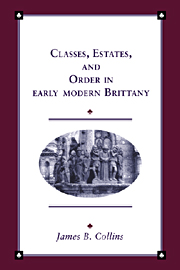Book contents
- Frontmatter
- Contents
- Preface
- List of abbreviations
- Glossary of French terms
- Introduction
- 1 The Breton economy in the sixteenth and seventeenth centuries
- 2 Elements of Breton society
- 3 Institutional structures of political control – financial and judicial organization
- 4 The Estates of Brittany and the Crown, 1532–1626
- 5 The Estates of Brittany and the Crown, 1626–1675
- 6 The burden of Breton taxation
- 7 The problem of order
- Conclusion
- Appendix
- Bibliography
- Index
- CAMBRIDGE STUDIES IN EARLY MODERN HISTORY
Conclusion
Published online by Cambridge University Press: 06 October 2009
- Frontmatter
- Contents
- Preface
- List of abbreviations
- Glossary of French terms
- Introduction
- 1 The Breton economy in the sixteenth and seventeenth centuries
- 2 Elements of Breton society
- 3 Institutional structures of political control – financial and judicial organization
- 4 The Estates of Brittany and the Crown, 1532–1626
- 5 The Estates of Brittany and the Crown, 1626–1675
- 6 The burden of Breton taxation
- 7 The problem of order
- Conclusion
- Appendix
- Bibliography
- Index
- CAMBRIDGE STUDIES IN EARLY MODERN HISTORY
Summary
Henri de Rohan, baron of Léon, duke of Rohan and so often president of the nobility at the Estates of Brittany between 1600 and 1620, wrote in 1617 that: “It is certain that in every kingdom the authority of the King diminishes that of the grands, just as the increase of theirs reduces the royal power; it is a balance that cannot remain equal, one of the sides must have superiority.” Rohan suggested that the power of the grands was more deleterious to public order but added: “I do not mean to speak against the grands, I would be speaking against myself. The more means they have, the more effective instruments they are for serving well the King. I know that those who have a well-ordered intelligence [esprit bien réglé], judge that their grandeur is that of their King; the grands are happier and more assured under a great King, than under those little sovereigns who fear everything.”
Early modern France was a society of contradictions, just as Rohan implies. He sees the struggle between the grands and the king for power, yet argues (from extensive personal experience) that what the grands really need is a great, not a weak king. Everywhere we turn, we find the same reality of “ this and that at the same time” rather than one that conforms to our utopian belief in “this or that” as the reality of social life. The transition to modernity – from feudal to sovereign government, from family to individual, from “violent, dirty, méchant” creatures to rational beings – created an insecure, terrifying world, one impossible to order even in hindsight. Just as the chronological web of history is seamless, so, too, are its social hierarchies.
- Type
- Chapter
- Information
- Classes, Estates and Order in Early-Modern Brittany , pp. 271 - 288Publisher: Cambridge University PressPrint publication year: 1994
- 2
- Cited by

